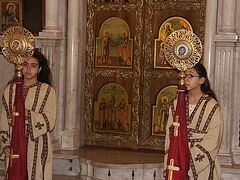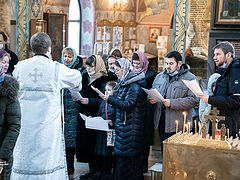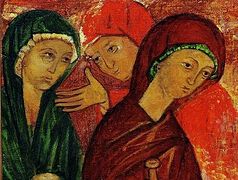I am informed that Sr. Vassa recently presented an in-person lecture and spiritual reflection at the seminar “Women and Lived Orthodoxy” at the New Valaam monastery in Heinavesi, Finland on September 15-17, 2023. Presumably this is the event she referred to in her Coffee with Sr. Vassa blog of September 17, under the title “Women’s Issues in our Church”. In her blog she described the conference as one to which “men were also invited, (but only one attended),” and at which “many women shared their concerns about the difference between the roles or “place(s)” open to them outside of church, and those open to them within the church”. I do understand why only one man attended, given the fact that the event promised to be a platform for the usual feminist attack on the Tradition of the Church. Why fly to Finland for something that you could get for free anytime online on Public Orthodoxy?
In her blog, Sr. Vassa wrote: “The vocations of women have expanded ‘outside’ church, not because of any rebellion or revolution brought about specifically by Orthodox Christian women, but because of various, God-given, historical circumstances, like the fairly-new (in the big picture of world history) reality of women receiving higher education, leadership and management positions in various fields, e.g., often being the primary bread-winners in their own families; prime ministers in government (as was a woman here in Finland, just recently); CEOs in corporations; tenured professors at academic faculties, etc.
But within the church, women’s vocations are still governed by canonical texts penned by men well over a millennium ago. And if any of us women try to speak about our new situation today, which calls for new canonical forms and norms, the reaction of our church-men to such a conversation is often like the reaction of the Apostles to the news of the women, who came from the empty Tomb on that Sunday morning two millennia ago: the men dismiss our testimonies as ‘idle tales.’ In fact, seeking to talk with our church-men about the need for new canonical forms and norms for women’s ministries often feels like seeking ‘the living among the dead.’”
It is not clear to me what Sr. Vassa means by “canonical texts penned by men well over a millennium ago”. Does she refer to the canons of the Church councils? Or perhaps the canonical Scriptures of the New Testament which clearly forbid women to function as teachers and clergy in the Church? Either way, it does seem clear that she is objecting to the Church’s two-millenia exclusion of women from such leadership positions in the Church as the clergy. In this she is hardly alone: such women as Elizabeth Behr-Sigel (d. 2005 at the venerable age of 98) and Eva Topping (d. 2011 at the age of 91) have been pushing this agenda for many years.
The reason she gives for objecting to this exclusion?—that times have changed culturally and that since women now occupy positions of authority in the world (such as “the primary bread-winners in their own families; prime ministers in government; CEOs in corporations; tenured professors at academic faculties”), there is no rational reason apart from anachronistic and outdated “canonical texts penned by men well over a millennium ago” that women may not now occupy such positions of leadership in the Church. In other words, the Church’s original rationale for excluding women from the priesthood and the episcopate was cultural and political, not theological. But is it?
For anyone formed by the patristic phronema, one must begin with the Scriptures, since that is the root to which the Fathers always returned. A complete exegesis and survey of the Biblical material is not possible here. But here I would like to focus upon a single text, as characteristic of the whole: that of 1 Timothy 2:11-12. It reads: “A woman must quietly receive instruction with entire submissiveness. But I do not allow a woman to teach or to exercise authority over a man, but to remain quiet. For it was Adam who was first created, and then Eve. And it was not Adam who was deceived, but the woman was deceived and became a wrongdoer.”
We note in this text that, assuming Pauline authorship (a topic too large to be debated here), the quietness in which a woman must remain in the liturgical assembly is not absolute: presumably a woman could pray or prophesy (with her head covered), and sing along with the rest of the assembly (1 Corinthians 11:13, 14:31, Ephesians 5:19). What was forbidden her here as elsewhere was authoritative speaking, teaching, and judging such as were done by the presbyters.
We note too the reason for the exclusion—it was not rooted in any lack of education or political power, but in the hierarchical order of creation. It is when she transgresses this taxis and order that the Enemy is able to step in and deceive. Denouncing this as “Rabbinical exegesis” (in the words of Behr-Sigel) is unworthy of truly Orthodox exegesis. We may or may not like it, but this prohibition is found in Holy Scripture (a “canonical text” though penned “well over a millennium ago”) and we are stuck with it. But we may still delve deeper into the proffered rationale for the prohibition, and ask why women are barred from the role of priest in the Church.
As C. S. Lewis intuited long ago in his essay Priestesses in the Church? a priest is not something that a person does, but something a person is—in other words, there is an iconic dimension to priesthood. In particular, a priest is not just someone who preaches, baptizes, liturgizes, counsels, etc. A priest is someone who functions as a father to a family, an icon of paternal authority, and gender is not unrelated to such fatherhood. In some single parent families, women may be forced to try to fill the father’s role, just as men may be forced to try to fill the mother’s role. But fathers and mothers are not interchangeable, as any young child can tell you. Men and women have different gifts, different approaches to life, and different roles in the family, and these differentia are supported by their biology. That is, the differences between male and female are not confined to mere anatomy; they go all the way to the heart and bone, and the job of the father in the family must inevitably draw upon those basic differences. Mothers and fathers are very different and these differences are rooted in biology. And because a priest functions as a father to the Church, priesthood is confined to men. (A more detailed examination of this topic can be found here.)
What happens in the world is irrelevant to this, for things like companies with CEOs, governments with Prime Ministers, and academic faculties with tenured professors are not families. They are human constructions, and do not partake of the divine hierarchical realities that families do—including the family that is the Church of God.
True lived Orthodoxy is rooted in the family of the Church—a family built upon apostolic foundations. And those foundations preclude women from the ordained priesthood. Women indeed have a valuable ministry—a ministry every bit as valuable as that of the priesthood, as do all the holy and baptized laity. But that ministry lies outside the confines of the altar. For Orthodoxy to be truly and well lived, it needs to be built upon apostolic foundations and remain within the limits set by the apostles.





